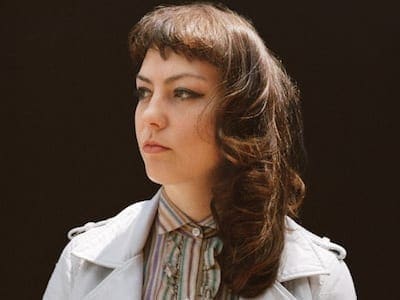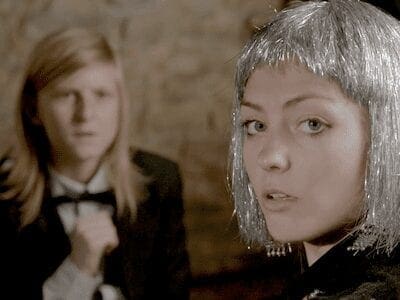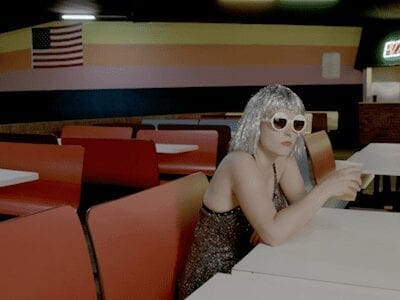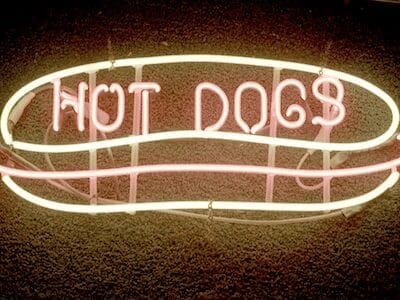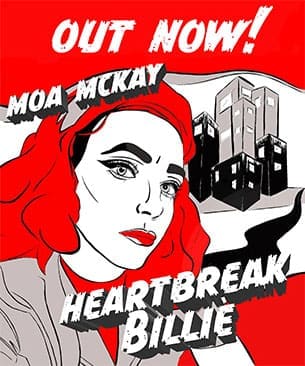Angel Olsen’s new album, My Woman, will be released on September 2 on Jagjaguwar and she’s playing Columbia Theater on 26.10. indieBerlin caught up with her to ask her about what she’s up to these days.
While she grew up in St Louis, Missouri, she moved to Chicago in her early twenties. There, she was discovered by Jon Hency through Myspace. He invited her to record some songs for a compilation album and thus began her musical career, with the recording of Strange Cacti in 2010. Made up of songs about love, heartbreak and topics which usually make up a first recording, it was followed by Half Way Home in 2012. In the meantime, she had gone on tour as part of Billy “Prince” Bonnie’s backup band.
Olsen then took a break to focus on her own music, and garnered a lot of attention in 2014 when Burn Your Fire For No Witness was released. It coincided with her departure from Chicago and she’s since then been in a non-stop cycle of touring and promoting.
My Woman is also a departure from Olsen’s previous records, with side A consisting of energetic yet melodic songs, and side B is made up of more sensual and reflective songs than previously heard. All and all, Angel Olsen matured over time, or as she put it, she’s relaxed into her songs.
indieberlin: I missed you last time you were in Berlin
Angel Olsen: Yeah I was there for a day.
indieberlin: What have you been up to since?
Angel Olsen: So I’ve been travelling since before that press trip. I had finished the videos (to “Intern” and “Shut Up Kiss Me”). So I made the record, went to Portugal, came home for a couple weeks, made the two videos that came out to my singles. Got an ulcer, finished mixing my record, went on tour for like five days with an old band and then I did the press trip right after. I then came home for two days and did a tour of Canada, Alaska and Iceland. I don’t know why, why there? But we didn’t know if the album was going to be ready, we weren’t sure.
We’d always wanted to go to those places. So, finished the tour in Iceland and went to New York, finished half of one third video that I’m directing, and then did press in New York for four days. Now I’m home and then I leave again on Thursday. So if that gives you any perspective, that’s probably why I cancel things sometimes. It’s nothing personal.
indieberlin: No worries, I didn’t take anything personally, I’m grateful that I got to interview you in the end, well right now. Do you have a cold? Because I hear you sniffling.
Angel Olsen: Yeah, I have a little bit of a cold. I think my body’s just like “Fuck you” and I haven’t been drinking. I stopped drinking ever since I got back to kind of clear my body, sleep and, you know, eat like hippie food, maybe go if I can afford it… See an acupuncturist or something. Travelling all the time is wearing me out.
indieberlin: I guess you’ve got to do that nowadays.
Angel Olsen: Yeah I’ve got to create some way to be zen in the airport security gate.
indieberlin: I listened to your latest album.
Angel Olsen: How many times did you listen to it?
indieberlin: Too often because I got blocked on the page, it said I’d reached too many connections.
Angel Olsen: Well that says something. I always ask how many times when I’m doing this kind of press, because people just listen to it right before they see me, and they haven’t even processed it. And I’m like: “Well I haven’t processed it either, I’m still in it, so what are we going to talk about?”
indieberlin: I was a huge fan of your previous album, Burn Your …
Angel Olsen: Burn Your Fire For No Witness
indieberlin: “Forgiven/Forgotten” gave me goosebumps, it was actually one of my alarm songs for two years.
Angel Olsen: It’s funny you say that, because I see so many problematic things on that album now. I’m happy that I made it. I still feel like it was much more agressive than this one, and for that time in my career I’m definitely psyched that happened. I wasn’t foreseeing that it was going to be successful, so it was very raw, and I hadn’t been in the music industry quite as much. I think that album will always be kind of part of the collection.
Everyone is going: “I loved her earlier work” or “I loved David Bowie’s earlier work”, “I love so and so’s earlier work” and I think for many people it will always be their thing. To me, when I look back to each work that I’ve done, I’m critiquing it and finding what’s missing in it. It’s fun to get a compliment on a song like that, because I know that I’ve performed that song a million times since that recording. I can sing it better in my live performance, so it’s such a weird capsule that I’m stuck in, but I also appreciate it, it’s a weird thing.
indieberlin: It seemed like a new beginning.
Angel Olsen: Yeah, I didn’t know it was at the time.
On side B I’m just trying to sing more and use my voice as an instrument and to not take myself so seriously
indieberlin: It went from folk to grungy in a few years, and now it’s becoming a mixture of both.
Angel Olsen: I would say I feel there are aspects of this album which are definitely R&B-influenced even or, I mean “Pops”, “Those Were the Days” and “Heart Shaped Face” are kind of stepping outside of, or maybe they’re part of “Dance Slow Decades” or “Windows” but branching out of that. If you’re familiar with that record, those two songs are me looking back, the songs I remember as going in that direction, but not quite being there yet.
I do often look at my work without trying to recreate the same formula, see how the work I’ve created now relates to the past. So, for example, “Never Be Mine” is a song that I relate to “Free” or a sixties sort of nostalgic thing. It’s not meant to be deep, you’re supposed to have fun. And then “Pops” sounds totally different: it’s a piano, but, you know, maybe because it’s the last song on this record, and “Windows” was the last song on the last record, I feel like they relate to each other. Maybe I’m making them relate to each other in that I’m using my voice in a different way than the rest of the record.
I do notice those things, “Not Going to Kill You” is probably the most agressive of the songs, other than “Shut Up Kiss Me”, and those two are very like “High & Wild” and “Forgiven/Forgotten”. But the thing about Burn Your Fire is that it was agressive but it was still naive. In my head I was naive, so it felt to me like I was presenting to the world my dissertation on Dostoyevski at seventeen, whereas now, I feel like I’m relaxing into my songs.
There’s still a little bit of me caring about getting a message across, and I think there will always be, but on side B I’m just trying to sing more and use my voice as an instrument and to not take myself so seriously. It doesn’t have to be about the words all the time.
I can sing more, my band can play more and I think everyone always sort of says: “Hey, Half Way Home compared to this album” or “Burn Your Fire compared to this album”, but I really do feel like each one should be different. They’re not going to be the same, and if they were the same, my life would be boring, the fans would be bored.
indieberlin: I read you moved to Asheville, NC, back in 2014. Did you move there to record Burn Your Fire ?
Angel Olsen: After the recording. We played this Pitchfork event while promoting Half Way Home and it was right after we recorded it. I flew to Texas to mix it with Jon Hency. It was a wonderful experience, just being in Dallas and not really knowing anything about how to get around. It was a bleak but beautiful place to mix a record in. Then I came home, and I sort of got to this point where I felt less and less attached to Chicago. I had visited a bunch of different places across the country, and sort of had been thinking about where I would want to go next.
Asheville was where a few friends had moved to from Chicago. I was finding that relationships I worked with all the time were becoming my closest friends, and I wanted to be around them. So I moved out here and I also really liked the peace of mind that being in a place that wasn’t a big city offered. There’s still a scene here, an art scene. People are definitely still human and that’s very obvious.
You know, it’s a small town. You have be aware of yourself, you have to tip well, you have to be nice to people, don’t gossip. There’s a lot of stuff in a small town which you can avoid in a big city. But it forces people to be, or attempt to be, more self-aware of the consequences of their actions.
In Chicago it felt like a biased experience in that, someone might be interviewing me, and later on I might realise: “Oh that person who interviewed me, I had a date with their roommate once.” In the same way, because I was promoting myself, being there for so long, almost a decade, I didn’t need to be there anymore. This is where people saw me grow up, and it’s like playing in your hometown, where it’s a wedding and a funeral all at once, because people come out of the woodwork.
When I come home to my apartment, I don’t talk to anyone about my music. I just chill the fuck out, and it’s awesome
People who didn’t care about what you were doing before come out of the woodwork, and people you love, and haven’t seen in a while, think it’s a good time to catch up. So they come to your show and you’re like: “I don’t really have enough time to talk to you, but I’d love to see you”. There is this kind of pressure, and it was a pressurised situation being there.
Someone might be talking to me about something, and at the end of the conversation, they might go: “I’m a huge fan by the way”, and even if I appreciated that, I’d be sort of weirded out. I just want to have a normal conversation. I don’t want to be a person who is that to you, I just want to be a person to you. It’s not even a thing that happened often enough but it was just becoming, perhaps because of my self promotion in Chicago, a kind of alienating factor in my lifestyle.
I really love Asheville, it’s a soft landing pad, especially because I’m travelling so much, always talking to people, trying to perform, make sure I’m saying the right thing. I always have to be on, and when I come home to my apartment, I don’t talk to anyone about my music. I just chill the fuck out, and it’s awesome, it’s the best thing ever.
indieberlin: I tried finding some information about Asheville. Robert Moog (inventor of the Moog synthesiser) apparently lived there towards the end of his life, and a rabid beaver attack has been making the news lately. What else is it famous for?
Angel Olsen: It’s like we have all these – it’s called Beer City – it’s all of these brewing companies are opening up because we have very good water, and a good source for it. It’s a rain forest, even though it’s not like Seattle or the North-West. But we do have some of the oldest mountains surrounding us. So there’s this diversity in tree life, plants and animal life, seeds and fruit and shit you can’t find all the time. It’s a beautiful place for those reasons but also, you’ve got the train hopper types, the people who belong in Portlandia. It’s a weird sort of a Berkeley of the South I’d say, with a mix of hicks in there sometimes.
People ask me about banjo players when they talk about Asheville because of the history of Appalachian culture, and I’m always like: “Just because I live here doesn’t mean everyone here plays a banjo”. It’s the same way if people hear from Alaska asking whether it’s cold. They just assume you’re always living near a glacier. But in Asheville, it’s definitely the living situation, the gentrification which is just as bad as in Chicago. There isn’t housing for people, and Airbnb keeps taking housing away.
People are retiring here from NY or Florida, buying up the houses and using them as Airbnb so no-one can live there. And though it’s bringing an income for the rest of the city, you’ve got to have that income for people to live here, for the young people to work at the cafés who serve the people buying those properties. It is a mixed up kind of place, it’s still struggling in a lot of ways. I feel like it’s still has yet to be conquered, it’s not totally eaten up yet.
I guess living here, I can see all the struggles I had in Chicago, the living situations and the weird way it works. Young people who are artists move to a poor part of town, and they make it look hip. They get older, or they attract people who are older, and want to have an affordable place to start a family, and then those people move in. The poor families are bought out of their businesses and their houses, and gentrification is plainly there.
And a lot of the time it’s because of art, because of people who make an area attractive, and those people are usually artists. It is weird to think about that. I do feel I was a part of that in Chicago, it’s a consequence of something that I don’t like because I was struggling at some point too, and I didn’t mean to be part of that struggle. We don’t mean to be a part of that, but it happens everywhere.
Startups can take advantage of the loopholes. Most of the time they’re good people, but they don’t see the consequences of what they’re doing. As part of a band, I can’t deny that we’ve stayed in Airbnbs and that we don’t find them helpful, but it is fucked up that in my own town it’s a problem. Even in a small town, where it’s peaceful and there are less people around, the number one reason we can’t afford housing is because people are buying the properties and using them for Airbnb.
There should be some sort of restriction. I’m not trying to be extreme and say it shouldn’t exist, but there should be some restriction on it to keep people from taking advantage of that situation and causing that problem.
indieberlin: Did you get the opportunity to visit Berlin?
I’m curious to learn about Berlin because of the people I’ve met
Angel Olsen: I did, I still haven’t been in Berlin for more than two days at a time, so it’s really hard to grasp what the city’s all about. But I did feel that, because of the bikes, I could relate it to Chicago. There are a lot of Americans living there. It’s very multicultural kind of place, but the interviews I’ve had have been the most interesting there. I don’t know if that has something to do with the place or Germany in general, or whatever, but the insightfulness and the kinds of unique directions of even conversations I’ve had about my album are reflective in that. I’m curious to learn about Berlin because of the people I’ve met and most of the people unfortunately have always been through work or talking about myself. But it would be cool to explore the city and spend a week there and kind of just see what’s going on.
indieberlin: One last question and I’ll let you go. You directed the video to “Shut Up Kiss Me”, with a bunch of clichés of the American way of life (diner, hot dogs, roller skates). Is that a critique or is it something you grew up with and decided to put in your video?
Angel Olsen: Honestly, there was no such thing, though I make sentimental music, visually, I was just trying to have fun. David Bowie had just died, and I went to a celebration at a roller skating rink before making the album, and everyone dressed up as Bowie. There was a contest there and they were playing all of his albums. It was so packed, people were hardly roller skating, they were just walking with skates on. And people were crying, others were laughing and I just felt like: “what a cool way to go out”.
I was inspired by that and went home, found a wig and I decided to glam myself up to kind of nod to Bowie. Presenting yourself under a ridiculous way, and reflecting a ridiculous thing. Even with a sentiment, a good one.
Angel Olsen is live in Columbia Theater on 25.10.16. Be sure not to miss it!
Interview by Patrick Bird

